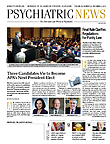Major changes in dissociative disorders include (1) derealization is included in the name and symptom structure of what previously was called depersonalization disorder; (2) dissociative fugue is now a specifier of dissociative amnesia rather than a separate diagnosis; and (3) the criteria for dissociative identity disorder are changed to indicate that symptoms of disruption of identity may be reported as well as observed, and gaps in the recall of events may occur for everyday and not just traumatic events. Also, experiences of dissociative identity disorder in some cultures are included in the description of identity disruption.
The questions below are from
DSM-5 Self-Exam Questions: Test Questions for the Diagnostic Criteria, which may be preordered from American Psychiatric Publishing at
http://www.appi.org/SearchCenter/Pages/SearchDetail.aspx?ItemId=62467. The answers and rationales are posted at
http://www.psychnews.org/pdfs/DSM-5_Self_Examination_QandA_17.pdf. The book, available in February 2014, contains 500 questions for all the categories of psychiatric disorders and includes Section III. The questions were developed under the leadership of Philip Muskin, M.D., a professor of clinical psychiatry at Columbia University College of Physicians and Surgeons. APA members may purchase the book at a discount.
1. Dissociative disorders involve disruptions or discontinuity in the functioning and integration of several psychological capacities. Choose the psychological functionality that is NOT involved in dissociative disorders.
a) memoryb) consciousnessc) perceptiond) delusional beliefse) emotional responses
2. Which of the following statements correctly identifies important clinical aspects and associated symptoms of depersonalization/derealization disorder, as it is now described in DSM-5?
a) Half of all adults have experienced depersonalization and/or derealizationb) Women are 1.5 times more likely to develop depersonalization/derealization disorder than menc) Most common onset of the disorder is between the ages of 25 and 35d) Suicide thoughts and behaviors are rare compared with other psychiatric diagnosese) The most common childhood traumatic experiences in persons with depersonalization/derealization disorder are physical and sexual abuse
3. Choose the one statement that accurately identifies a change in dissociative fugue from DSM-IV-TR to DSM-5.
a) In DSM-5 but not in DSM-IV-TR, a fugue event is diagnosed as dissociative identity disorder, if it takes place in conjunction with the symptoms of that disorderb) In DSM-5 but not in DSM-IV-TR, a fugue event secondary to temporal lobe epilepsy can be diagnosed as dissociative fuguec) In DSM-5 but not in DSM-IV-TR, fugue states are diagnosed only as a specifier of dissociative amnesia (that is, dissociative amnesia with dissociative fugue)d)DSM-5 but not DSM-IV-TR recognizes that fugue states are more common in dissociative amnesia than in dissociative identity disordere) In DSM-5 but not in DSM-IV-TR, fugue states are seen primarily as pathology of identity continuity ■
